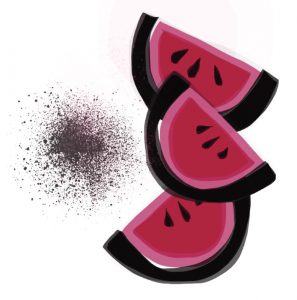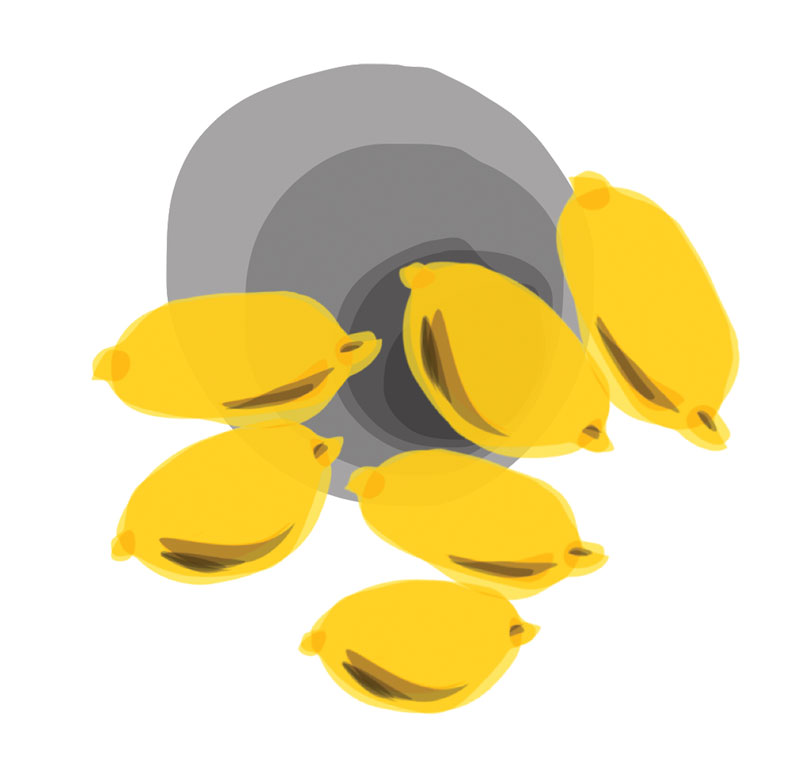Much is needed to stand out in the world of food writing. Along with security, love, and oxygen, food is one of the essential needs of human existence, and as a result, countless authors have mused upon its significance. Recipe writing is a particularly saturated corner of this market. Recipes thrive in the online world, and most are accompanied by paragraphs of personal back-story and pop-up ads, which do all they can to prevent the reader from getting to the information they came for in the first place.
In seeming response to this, Tip Of Your Tongue by Amna Elnour does something different with the recipe writing formula. Her exemplary use of observational prose creates an experience that is engaging, instructive, and mouth watering all at the same time. Tip Of Your Tongue is a rare form of recipe writing, one that can be read for the knowledge it provides, or for the meditative pleasure of its script.
The project is broken into six chapters. Within these chapter are several sub-sections, each outlining a specific dish, spread, or dessert. Elnour’s poetic style mixed with the conviction of the recipes gives Tip Of Your Tongue its true charm, and each reading feels like unravelling a riddle you know you are privileged to experience.
Elnour begins Tip Of Your Tongue with a poem, and its intimate prose sets the tone for the rest of the work. The first recipe, mayonnaise, is delivered in a numbered list format, a style that makes repeated appearances in Tip Of Your Tongue. While some entries in the list get right down to the business of making, many have a more lyrical feel to them —such as the ninth point, which discusses the process of whisking the mixture: “Keep the ritual from becoming anesthetic, or let it be if you need. Could be casual or just as easily sacred.” Cooking can be a utilitarian chore, or it can be a soothing, fun activity wrapped in ritualistic importance. Food can be made for one, for many, alone or with others, professionally or begrudgingly. Tip Of Your Tongue revels in this dichotomy, and through the text you can sense Elnour’s empathy and cynicism. There is personality here beyond the simple instructions, and the addition is pure nourishment.
One of the key tenets of Elnour’s voice is colloquialism. The recipes often speak to you as if you were in the room with them, and leave many elements open to interpretation. This can be seen when discussing zhoug, a Yemeni style hot sauce: “If you don’t have a mortar and pestle, or time, or the ability, use a blender, or chop as finely as possible and use spice grinder in small
portions…or put everything in a sealed bag and strategically smash it with a jar.” This type of language cuts the rigidity often found in instructional writing, and encourages any who would doubt her culinary abilities. So much of food creation relies on interpretation, personal taste, and tool set, and Elnour’s good humor suggests that anyone can make the dishes she describes.
That being said, Elnour isn’t afraid to get serious when the time calls for it. This is someone who clearly knows what they’re doing with food. She has a diverse pallet, and outlines recipes from multiple traditions, including Middle Eastern, Greek, European, and North African. The advice she gives clearly comes from a place of wisdom and experience, and after reading Tip Of Your Tongue, you’ll have a much deeper understanding of oils, dough, spices, and the priceless worth of the common onion.

These segments explore a variety of topics, and all this information is packaged within Elnour’s observational prose. Chapter 6, Performative, discusses a repairman visiting a kitchen with a broken dishwasher, and the disdain that follows: “The repairman calls me over to point out the cockroaches living in the machinery of the dish sanitizer…I am a little embarrassed that it doesn’t phase me…Doesn’t he know he’s only there fix the machine until the next time one of us slams the $7000 hunk of metal so hard it breaks, i.e. in 2 weeks?” Working in a poorly run kitchen can be a neglectful, unforgiving experience, and this observation is woven into a recipe for cardamom buttercake. It’s an intriguing combination, and reminds us that there are often grim realities beneath sugar-coated surfaces, especially in the world of food. Other more abstract passages require readers to fill in the blanks: “Everyone learns intimacy somewhere, and then later you find you’re expected to re-learn, you’re reproducing the image rather than doing…every time it’s new, you have to participate in the building of the instant.” Perhaps making food is akin to intimacy, something that exists solely in the moment, no matter your past experiences? There are dozens of similar passages in Tip Of Your Tongue.  They leave themselves open to interpretation from the reader, and are much more personnel and intriguing as a result.
They leave themselves open to interpretation from the reader, and are much more personnel and intriguing as a result.
Tip Of Your Tongue is a singular experience. Rarely will you find food writing so informative, entertaining, and esoteric. Elnour makes a name for herself in a realm so often oversaturated and redundant, and her creations will stimulate your mind as much as your salivary glands. Highly recommended for poets and would-be cuisiniers alike.


